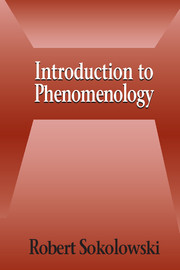Book contents
- Frontmatter
- Contents
- Acknowledgments
- Introduction
- 1 What Is Intentionality, and Why Is It Important?
- 2 Perception of a Cube as a Paradigm of Conscious Experience
- 3 Three Formal Structures in Phenomenology
- 4 An Initial Statement of What Phenomenology Is
- 5 Perception, Memory, and Imagination
- 6 Words, Pictures, and Symbols
- 7 Categorial Intentions and Objects
- 8 Phenomenology of the Self
- 9 Temporality
- 10 The Life World and Intersubjectivity
- 11 Reason, Truth, and Evidence
- 12 Eidetic Intuition
- 13 Phenomenology Defined
- 14 Phenomenology in the Present Historical Context
- Appendix: Phenomenology in the Last One Hundred Years
- Select Bibliography
- Index
9 - Temporality
Published online by Cambridge University Press: 05 June 2012
- Frontmatter
- Contents
- Acknowledgments
- Introduction
- 1 What Is Intentionality, and Why Is It Important?
- 2 Perception of a Cube as a Paradigm of Conscious Experience
- 3 Three Formal Structures in Phenomenology
- 4 An Initial Statement of What Phenomenology Is
- 5 Perception, Memory, and Imagination
- 6 Words, Pictures, and Symbols
- 7 Categorial Intentions and Objects
- 8 Phenomenology of the Self
- 9 Temporality
- 10 The Life World and Intersubjectivity
- 11 Reason, Truth, and Evidence
- 12 Eidetic Intuition
- 13 Phenomenology Defined
- 14 Phenomenology in the Present Historical Context
- Appendix: Phenomenology in the Last One Hundred Years
- Select Bibliography
- Index
Summary
Phenomenology has developed a highly articulated theory of time and temporal experience. The temporality that it describes plays an important role in the establishment of personal identity. Furthermore, it is in the domain of temporality that phenomenology approaches what could be called the first principles of the things that it examines. Time pervades all the things, both noematic and noetic, that are discussed in phenomenology, and the description of the phenomenological “origin” of time gets to a kind of philosophical center.
LEVELS OF TEMPORALITY
Three levels of temporal structure can be distinguished.
1. The first is world time, the time of clocks and calendars. It can also be called transcendent or objective time. This is the time that belongs to worldly processes and events. When we say that a dinner lasted two hours, or that Mary returned two days before Doris, or that the overture precedes the opera, we arrange such things and events in world time. Such time can be compared to the spatiality of the world, the geometric extension that things possess and the local relatedness that they have with one another. Like such space, objective time is public and verifiable; we can use a clock to measure exactly how long a process takes, and we will all agree on the measurement. The time being measured is located in the world, in the common space we all inhabit.
2. The second level is internal time. It can also be called immanent or subjective time.
- Type
- Chapter
- Information
- Introduction to Phenomenology , pp. 130 - 145Publisher: Cambridge University PressPrint publication year: 1999



